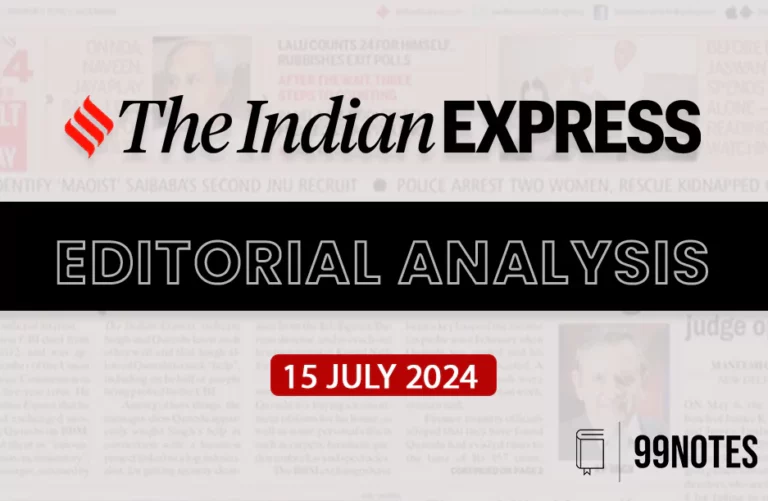22 October 2024 : Indian Express Editorial Analysis
1. Berlin-Delhi reconnection
(Source: Indian Express; Section: The Editorial Page; Page: 10)
| Topic: GS2 – International Relations |
| Context: |
| The article discusses the strategic importance of German Chancellor Olaf Scholz’s visit to India, emphasizing the potential for deeper economic and defense cooperation amid shifting global alliances. |

Significance of German Chancellor Olaf Scholz’s Visit to India
- In the midst of a season filled with global summits, German Chancellor Olaf Scholz’s visit to India may seem less glamorous compared to summits with the U.S. or more trusted partnerships such as those between India and Russia.
- However, the Indo-German summit holds significant potential, especially in enhancing the bilateral strategic partnership and reshaping India’s broader engagement with Europe.
- While meetings with the U.S. carry international prestige, and encounters with Russia and France reflect deep historical and ideological ties, Germany’s approach, though understated, could have substantial consequences for India’s domestic growth and international rise.
Global Context and the Commonwealth-BRICS Comparison
- Scholz’s visit is framed by several high-profile international gatherings, such as the Commonwealth summit in Samoa and the expanded BRICS forum in Kazan, Russia.
- These highlight contrasting global relationships for India. The Commonwealth summit emphasizes India’s historic ties with the British Empire, and its position as the largest economy in the 54-nation group offers India an opportunity to elevate the Commonwealth’s international standing.
- On the other hand, BRICS is seen as a forum that heralds the future of a post-Western global order, despite internal contradictions within the group. While BRICS attracts broader interest as an alternative to Western dominance, Germany’s offering of pragmatic support for India’s domestic transformation could be more immediately beneficial.
Germany’s Strategic Shift in its Relationship with India
- Historically, Germany and India have shared a special relationship, formalized through a strategic partnership since 2000. However, this relationship has often struggled to move from intent to outcomes.
- Scholz’s visit marks a potential shift, particularly in the context of global conflicts such as the Ukraine war. Although India’s neutral stance on Ukraine has caused friction with European countries, the prolonged conflict has led to a reevaluation of relations, with Germany recognizing the need to engage India more meaningfully.
- This engagement includes an acknowledgment of India’s growing geopolitical significance, as well as the necessity of dialogue to manage differences, especially concerning Russia.
Economic and Security Cooperation
- A key element of Scholz’s visit is the focus on strengthening economic and security cooperation. Germany, traditionally focused on China in its Asian economic policy, is now seeking to diversify its partnerships, with India emerging as a priority.
- Scholz arrived with a large business delegation, hoping to expand German investments in India, which aligns with India’s goal of revitalizing its manufacturing sector.
- On the security front, Germany is ready to enhance defense cooperation with India, ranging from military exchanges to joint arms manufacturing. Notably, Germany’s offer to help India develop its domestic weapons industry, including potential submarine acquisitions, underscores Berlin’s commitment to modernizing India’s defense capabilities.
Indo-German Partnership in the Evolving Global Order
- Scholz’s visit symbolizes a new phase in Germany’s international strategy, driven by the need to rethink its post-World War II geopolitical stance. Russian expansionism, Chinese assertiveness, and shifting U.S. policies have pushed Berlin to reconsider its global responsibilities.
- Germany’s new strategic approach to India, detailed in a recent government paper, highlights India’s growing prominence in global politics and emphasizes the potential for deeper economic and defense collaboration.
- As India navigates its complex relationships with China, Russia, and the U.S., a strengthened partnership with Germany could provide much-needed balance and stability in India’s foreign policy.
Conclusion
- In conclusion, while Germany may not offer grand visions of a new world order, its pragmatic approach—grounded in economic cooperation and defense partnerships—could significantly bolster India’s global ambitions.
- By enhancing its ties with Germany, India stands to benefit not only from economic investment but also from greater security cooperation, positioning both nations as influential players in an evolving global landscape.
| Practice Question: Discuss the significance of German Chancellor Olaf Scholz’s visit to India in the context of evolving global geopolitics and its potential impact on Indo-German relations, particularly in the areas of economic cooperation and defense. (250 words/15 m) |
2. A terror attack, many signals
(Source: Indian Express; Section: The Ideas Page; Page: 11)
| Topic: GS3– Internal Security |
| Context: |
| The article analyzes the recent terror attack on the Z-Morh tunnel project in Jammu & Kashmir as part of a broader strategy by Pakistan’s deep state to disrupt peace and exploit India’s vulnerabilities in the region. |
Revival of Terror in Jammu & Kashmir
- The recent terror attack on employees of the infrastructure company working on the Z-Morh tunnel signals a disturbing revival of terrorism in Jammu & Kashmir (J&K).
- It highlights two key issues: the resurgence of violence across the region and the possibility of a coordinated strategy to exploit India’s vulnerabilities.
- This attack is not an isolated event but part of a broader effort by Pakistan’s deep state to disrupt the peace and stability that India has been working to establish in J&K, particularly following the peaceful conduct of elections and the installation of a democratically elected government in Srinagar.
Pakistan’s Deep State and Proxy War Tactics
- The timing of the attack is telling, as it comes after a period of relative calm in J&K, which Pakistan’s deep state likely views as a threat to its strategic interests.
- The attack underscores Pakistan’s ongoing attempts to reassert its relevance in J&K by disrupting India’s efforts to normalize the region.
- With the abrogation of Article 370, Pakistan’s claim over Kashmir has been significantly weakened, prompting the deep state to resort to high-intensity terrorist activities to prevent the dividends of peace from materializing.
Peripheral Areas as Strategic Targets
About Z-Morh Tunnel:
- It is an under-construction 2-lane road tunnel between Gagangir and Sonamarg on the Srinagar-Leh Highway in Jammu and Kashmir.
- It is named for the Z-shaped stretch of road between Sonamarg and Gagangir that the tunnel will replace.
- Length: 6.5 km
- Elevation: 8,960 feet.
- The tunnel is designed for the flow of 1,000 vehicles an hour at an approved maximum speed of 80 km per hour.
- Importance:
- At 8,960 feet, tourist destination Sonmarg is covered in snow during the winter season, forcing locals to shift to Srinagar. Z-Morh tunnel will ensure that Sonmarg town in Jammu & Kashmir remains connected as well as supplies are maintained all year round.
- It will ensure all-weather connectivity between Srinagar in Jammu and Kashmir and Kargil in Ladakh.
- Strategic Importance: Along with the 14.15 km Zojila Tunnel to its east, it aims to enhance the Indian military’s capabilities in Kashmir and Ladakh along both the Line of Control (LOC) to the north and the Line of Actual Control (LAC) further east.
- The choice of the Z-Morh tunnel as a target also suggests a shift in strategy, with peripheral areas now being exploited for terrorist activity.
- Traditionally peaceful and less guarded compared to urban centers like Srinagar or Anantnag, these areas present easier opportunities for attacks.
- The Z-Morh tunnel, being a flagship infrastructure project requiring a large workforce, is an attractive target.
- This tactic could be part of a broader plan to target infrastructure projects in outlying areas, which are vital for the region’s development but less fortified against such threats.
Implications for Other Infrastructure Projects
- The attack on the Z-Morh tunnel raises concerns about the security of other critical infrastructure projects in the region, such as the Kishanganga project near the Line of Control (LoC) and railway projects in Banihal and Qazigund.
- These projects are key to J&K’s development and India’s strategic interests, and their vulnerability to terror attacks could have far-reaching implications.
- The adversaries’ focus on peripheral infrastructure rather than traditional conflict zones reflects smart military thinking, aimed at diverting attention and stretching security forces thin across the region.
Larger Geopolitical Context and Intelligence Concerns
- This attack appears to be part of a broader pattern of unusual events targeting India, including bomb hoax threats, unexpected blasts, and diplomatic tensions over transnational issues.
- These incidents could be connected to a larger plan aimed at undermining India’s emerging strategic confidence.
- The coordinated nature of these activities suggests that intelligence agencies must remain vigilant, not just in neutralizing terror networks but also in addressing the revival of overground workers, terror financing, and the drug mafia, all of which contribute to sustaining the proxy war in J&K.
Conclusion: The Proxy War is Far From Over
- The terror attack on the Z-Morh tunnel is a stark reminder that the proxy war in J&K is far from over. While the frequency of violence may have decreased, complacency is not an option.
- Pakistan’s deep state continues to seek opportunities to disrupt peace and development in the region, and India must remain vigilant.
- Security forces, intelligence agencies, and political leadership must work in tandem to counter these threats and ensure that the progress made in J&K is not undone.
| What Should India Do Next? |
|
Enhance Security Protocols: India should tighten security measures, especially in vulnerable areas like Rajouri-Poonch, where recent shifts in terrorist activities have been noted. Diplomatic Engagement: Despite the challenges, India should seek diplomatic avenues to reduce tensions, possibly resuming quiet talks that have sporadically occurred. Counter-Terrorism Strategies: Strengthen counter-terrorism tactics, including the use of advanced technology to bridge the intelligence gaps caused by troop redeployments to other regions. International Pressure: Continue efforts to isolate Pakistan internationally, focusing on its role in sponsoring terrorism, while addressing anti-India rhetoric effectively at global forums. |
| PYQ: The scourge of terrorism is a grave challenge to national security. What solutions do you suggest to curb this growing menace? What are the major sources of terrorist funding? (250 words/15m) (UPSC CSE (M) GS-3 2017) |
| Practice Question: Examine the global water crisis as highlighted by the Global Commission on the Economics of Water. Discuss the major challenges in water management and suggest measures to ensure sustainable water use and equitable access to water resources. (250 words/15 m) |


